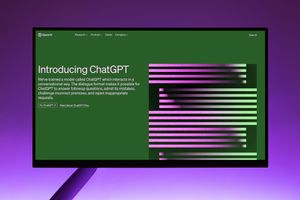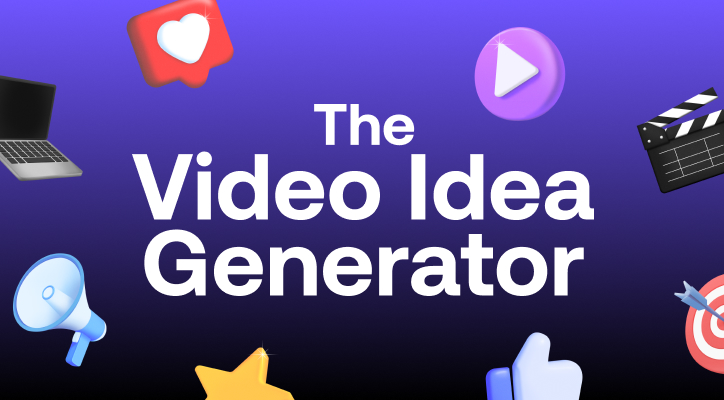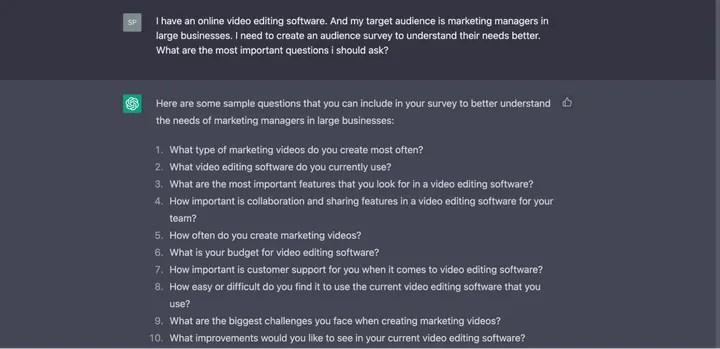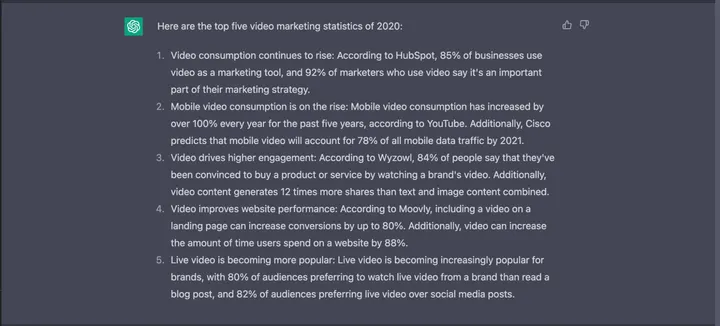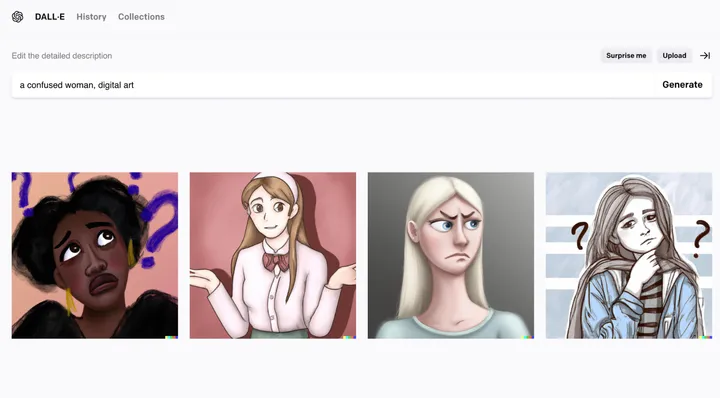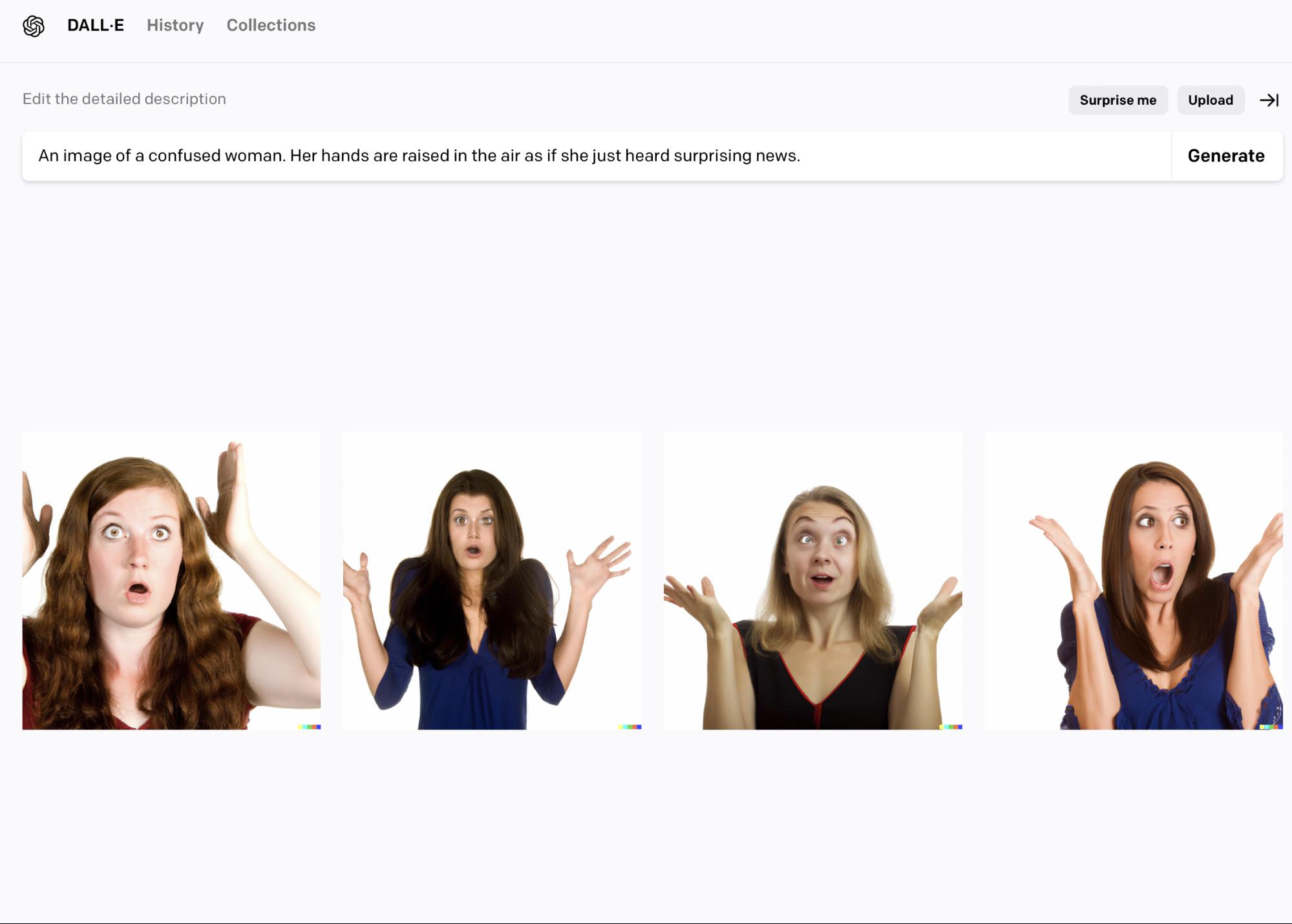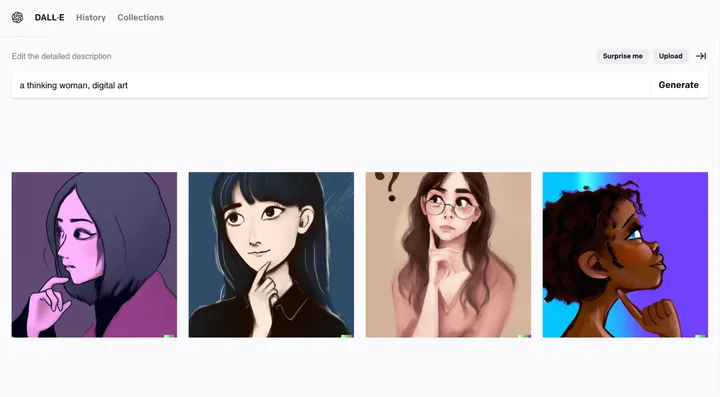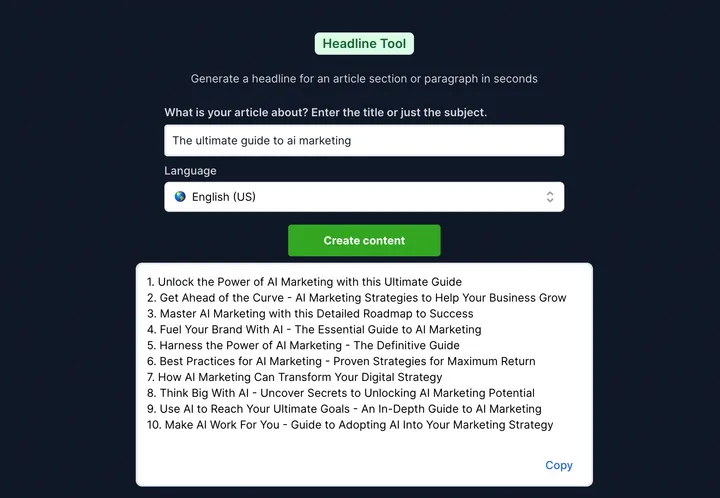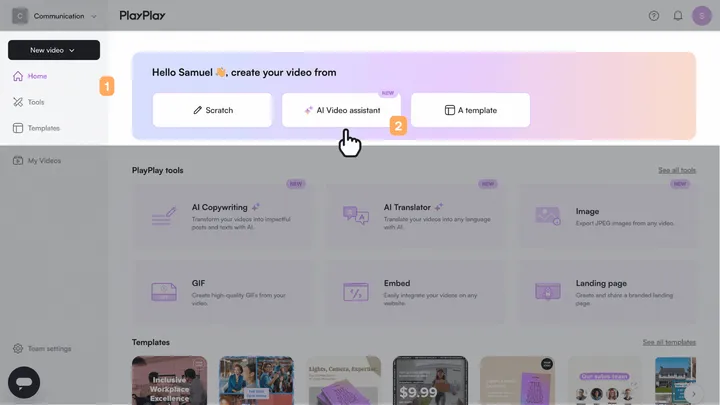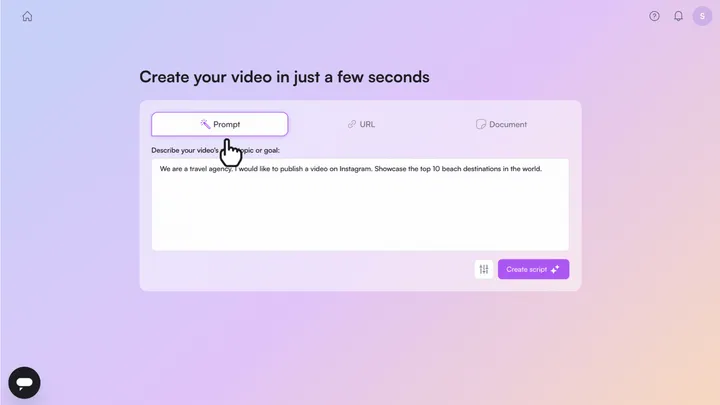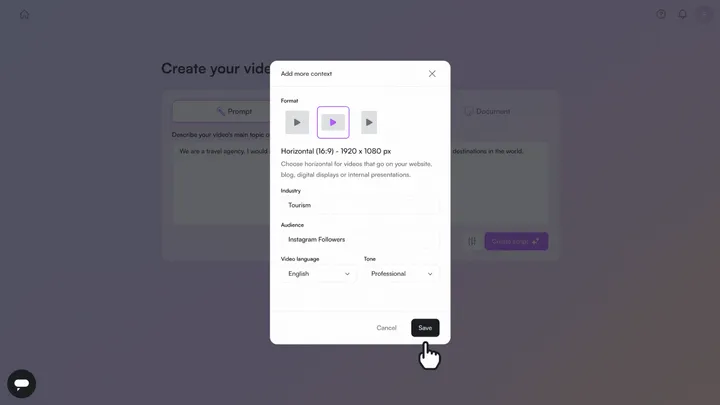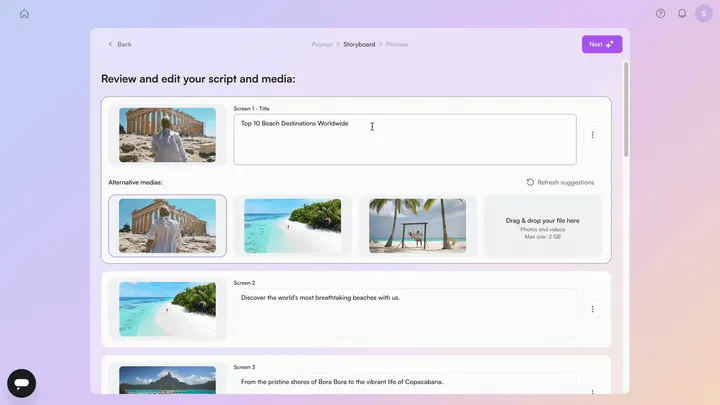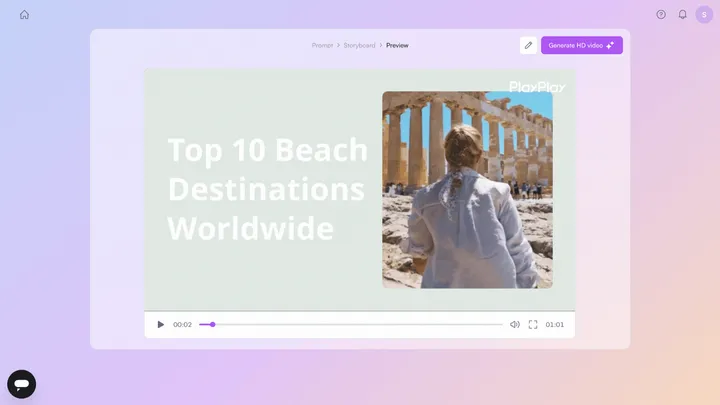Movies like The Matrix and the Terminator franchise made us think of artificial intelligence as this scary thing — angry, indestructible machines waging war against humanity.
Fast-forward to 2024, and the machines have not waged war against us … just yet. Instead, we are working WITH artificial intelligence to make our lives easier — how ironic!
The most recent step in our union is AI marketing — a suite of artificial intelligence software that can accelerate marketing output if used correctly. Read on to learn how marketing managers like you use artificial intelligence to beat the creative block, win clients and launch exciting digital marketing video campaigns.
What is AI Marketing?
AI marketing means using artificial intelligence tools to significantly speed up marketing execution.
These tools, sometimes free, have a range of applications. For example, Jasper and Writer auto-generate content for emails, blog posts, and landing pages; Peak.AI automates customer segmentation; and Midjourney creates images and illustrations.
Savvy marketers treat AI tools as assistants that complete tedious tasks with impressive pace and efficiency, so they can focus on creative aspects they actually enjoy. Say you are writing a blog post; you can produce a first draft with Jasper to reduce how long your content production takes. Using Jasper can save you time and money for your blog post writing!
AI is a game-changer for marketing teams that want to scale their efforts without growing headcount at the same pace. By strategically incorporating these tools into their workflows, small marketing teams can amp up execution to the level of or even surpass larger teams with bigger budgets. Marketers can also benefit from free AI tools that will save them both money and time.
5 ways marketers can use AI to boost their marketing strategy
Consider this scenario: You ask a newbie marketer on your digital marketing team to transcribe a 30-minute expert interview. So, they get to work — listening to the audio repeatedly to make out the right sentences and write them down. They start working—listening to the audio repeatedly, trying to catch every word. But since sensitive information is encrypted in some parts, they struggle to make out key details. Needless to say, the process is tedious, takes a lot longer than thirty minutes due to the constant back-and-forth, and the final result has several errors.
A better way to complete this task is to use transcription software like Rev or Otter.ai. The newbie marketer simply uploads the audio interview to the AI software and it does the work for them, saving many billable hours.
Automated transcription is just one of many ways to use AI for promotional campaigns. We spoke with some marketing managers to better understand how they integrate AI into their tool stacks.
1. For marketing strategy ideation
Bridget Greenwood, the founder of The Bigger Pie and The200BnClub, helps first-time founders create killer strategies with AI.
“We have developed several AI prompts to guide our founders’ go-to-market strategy ideation processes,” explains Bridget.
“These prompts help them maximize the potential of ideation tools like ChatGPT. They can hone their brand’s tone of voice, understand the psychology of their target market and choose the best content creation channels seamlessly.”
Borrowing a leaf from Bridget’s team, we tried brainstorming consumer research survey questions with ChatGPT.
What we got were basic questions based on research that still required expert input. They were a great start, but we could not send them to survey respondents as they were. We had to finetune the AI output to match our business context. Nevertheless, ChatGPT had hugely helped with question ideation and cut the task time in half — making this experiment successful based on the associated data.
Bridget shares a similar opinion based on the use of ChatGPT:
“You have to be careful when using ChatGPT for ideation. It is your assistant, not a replacement. Learn how to use it properly. Layer and refine your prompts until you get outputs that match your business and customers needs. The quality of output can also change depending on the tool's capacity and demand levels at the time you are using it. Rely on your judgment and expertise in your field of knowledge.”
Luckily, some versions of ChatGPT are completely free, so your marketing team doesn’t have to spend any money on improving their marketing strategy in a small amount of time.
Want to learn how you can use ChatGPT for video marketing?
Get our 30 ChatGPT ready-to-use prompts and rediscover the power of video and AI.
Download the prompts. 2. For customer data analysis
AI tools give you the power to quickly uncover unique insights hidden in a sea of customer data.
Most businesses have hit a data saturation point — meaning there’s too much research and feedback lying dormant. And marketers are too busy to manually sift through large volumes of information to find “aha” moments that transform how they interact with customers.
Enter AI — an easy way to extract qualitative and quantitative information from customer data.
Let’s say you want to break video testimonials into bite-sized clips for distribution. You can use Laudable to help you find high points from customer testimonials and automatically extract them into video format.
Suppose you want to identify churn risks in your customer base. In that case, Dialpad can run real-time sentiment analysis during sales calls to know how a particular customer feels about your brand.
Ollie Whitfield, Demand Generation Team Lead at VanillaSoft, explains how AI tools helped him get up to speed in his current role.
“One of the first things I did in my job was using a call recording software which uses AI to map out how sales calls between us and our prospects went. It gave me an insight into how differently certain topics or words were being used by our target market. And how much they talked about one thing versus another. That's a massive help.”
Ultimately, you will do better marketing if you rely on actionable findings to understand how your customers think and act — not guesswork.
3. For content generation
Every marketer we spoke with mentioned automating some aspects of their content creation process with AI.
These tools do the heavy lifting for time-consuming and repetitive content tasks. For example, Tom Bourlet, Head of Marketing & Social Media at Fizzbox, uses AI writing assistants to produce ad copy variations for PPC campaigns quickly.
“When working on our social media PPC campaigns, we have to create ads that have 15 headlines and four descriptions. Much of our time is spent trying to think about how the copy should be written. However, tasks like this can be made much quicker by using AI to come up with potential headlines and descriptions.”
4. For improved Search Engine Optimization
AI can be extremely useful for any company aiming to boost their Search Engine Optimization (SEO). AI can help businesses identify any SEO gaps, while offering insights into competitor strategies. AI is a great tool for searching precise keywords, understanding their popularity on the web, and helping you implement them in your communication channels such as your website. This way, your content will be optimized as much as possible each time it is published!
5. For competitive intelligence
Luckily, some AI tools are there to provide any company with real-time insights into their competitors’ business strategies, such as pricing, marketing campaign strategies, product updates, and customer feedback.
It is very common for companies to leverage competitive intelligence, so they are more likely to position themselves correctly on the market. Understanding competitors’ business strategies is key for creating a product or service that matches the needs of the target audience.
3 ways to use AI for your brand’s content generation
When used right, AI is a force multiplier for content creators. It cannot handle your entire creative process — and you should not outsource this in the first place. But it can support different content creation stages, including:
1. Research
AI research tools like ChatGPT can quickly compile and present important information about a particular topic in one place. Instead of spending hours researching subjects from scratch, you can now instantly generate topic ideas.
Adelina Karpenkova, a freelance content marketer, says this method saves her 1–2 hours of work.
“As a writer, I take screenshots of interfaces, workflows, amazing ads, and other outstanding examples all the time. But if I cannot find something in my folder, I will ask ChatGPT 4 to help me out. It is particularly good for finding information on the changes you cannot trace easily on the web (e.g., interface updates). Also, I used to spend hours drilling down the G2 reviews, trying to figure out the app’s strengths and weaknesses. Now, I start by asking ChatGPT to summarize opinions, and only then do I go to G2 — to make sure there's truth in those words.”
Like Adelina, you can use AI to gather industry stats, third-party reviews, and unique examples that improve your content quality.
As a test, we asked ChatGPT for the top five video marketing stats — here is what it said:
This gave us a great headstart on our research, even though we had to verify the data independently.
2. Creating images and illustrations
How often have you seen stock images like the one above? At least more than once. You have probably used them a few times too.
No thanks to lean budgets, busy schedule constraints and barely-there graphic design skills, many digital content marketers rely almost entirely on bland stock images that add little value to their blog posts or social media posts.
But things are changing with AI.
Thanks to tools like Midjourney and DALL-E, anyone can now create unique feature images for landing pages and blog posts with just a few prompts. You input a prompt into the software, and the algorithm generates images based on it. The more specific your prompt is, the better the image you get — as with everything AI.
Here are some of our attempts:
Using AI to generate images is fast, cost-effective, and helps your AI marketing content stand out from the rest. And the customers usually love them.
3. Content formatting
Content formatting is everything you do to get an article ready to publish, like:
- Writing personalized alt texts for images
- Drafting meta titles and meta descriptions for Search Engine Optimization
- Adding personalized headings and bullet points
- Writing social media ads
Completing these seemingly small tasks becomes difficult — and that’s where AI tools come in with all their data.
Using writing assistants like Copy.ai, Jasper, Copylime, and even ChatGPT, you can quickly generate alt texts, meta information, and headlines for your articles and hit your publishing deadlines.
For example, we used Copylime’s headline tool to come up with multiple headline variations for a sample blog post in just a few seconds thanks to the data of the AI tools.
It is a game-changer for writers.
Lana Rafaela, Founder of Cherry Red Content, says,
"As a content marketer, I used to be wary of AI. However, these days I use it to streamline repetitive tasks like headline ideation, meta description creation, and formatting. It's been great at helping me create briefs for writers too. My team also often uses AI to format clients' data into bullet points and takeaways.”
7 benefits of using AI for your brand’s marketing strategy
Now that you understand what AI is, let’s take a look at why you can’t avoid implementing AI into your daily routines. Here are a number of ways that AI can be used to enhance your marketing team’s capabilities and produce more effective outputs, fast.
1. Data analysis and insights
AI can help to analyze large sums of data quickly, uncovering patterns and identifying correlations that may be harder for the human eye to pick up on. These can then be collated into actionable insights and recommendations, empowering teams to make more informed decisions.
2. Personalization
Data can be leveraged to produce tailored experiences for individual consumers, taking into account their personal behavior, preferences and historical actions. By creating personalized content and offers, you can enhance their engagement and increase your conversion rates.
3. Automation
AI can be used to automate repetitive and time consuming tasks, such as email marketing, social media posting and content creation, freeing up the team’s time to focus on high-value activities such as creative and strategic initiatives.
4. Forecasting
Use predictive algorithms and machine learning to forecast future trends, behaviors and outcomes, allowing the team to anticipate customer needs and optimize their strategies accordingly.
5. Content creation
Use AI-powered tools such as Natural Language Processing tools like ChatGPT to aid in content creation and optimization, building personalized experiences and streamlining processes.
6. Customer service
AI-powered chatbots can be used to handle customer enquiries and provide real-time assistance. Findings gleaned from these conversations can also lead to future product development – helping your coworkers to always stay ahead of the curve in this competitive landscape.
7. Competitive analysis
You can also use AI to automatically gather industry market insights and data by compiling competitor information and giving your coworkers a comprehensive understanding of the landscape. This can guide decision-making and product development processes and help you stay ahead of the competition.
How marketers overcome AI challenges and ethics
As with many new technologies, there are some common challenges and concerns that come alongside the usage of AI within the marketing industry. For example, as AI systems usually rely on large amounts of data to train and make accurate predictions, there is always a concern around data protection and ensuring any sensitive information is encrypted and kept safe. It’s crucial to implement robust data privacy measures, such as data anonymization and encryption, as well as complying with the relevant regulations in your location (such as GDPR) to safeguard people’s data and ensure it’s used lawfully.
Using Virtual Private Networks (VPNs) can add an extra layer of security by encrypting internet traffic and masking IP addresses, further protecting sensitive marketing data during transfer and access. For a detailed analysis of one popular option, we recommend reading the Cybernews Surfshark review.
AI models are also capable of inadvertently inheriting biases present in the data they’re given, leading to discriminatory outcomes and reinforcing societal biases that may exist. Regular audits of your AI systems can work to prevent this, as well as ensuring that you include input from others within the business to ensure a broader perspective.
It’s worth noting that many AI algorithms, particularly deep learning models, can be very complex and difficult to understand, making it more difficult for them to be explained on a wider level. This can undermine trust in the process and raise concerns about unfair or incorrect outcomes. This means employees should make an additional effort to develop AI models that are as transparent as possible, providing clear explanations for their predictions and ensuring users understand how decisions are being made.
How marketers should collaborate with AI
As with many partnerships, data-driven creativity relies on collaboration. This is what helps you and your team to realize the full potential of AI in marketing, using it as a tool to augment human capabilities rather than replace them.
The important thing is to make sure the systems work for you, solving problems that you have, increasing your outputs and helping you to deliver better experiences for your client base. Research is key here – by identifying exactly how you want the systems to work and which applications are best suited for this you’ll be able to select the right tools. Helping you leverage your data conclusions and make informed and sturdy decisions.
Create stunning videos with PlayPlay’s AI Assistant
With PlayPlay, you’ll be able to create stunning videos in just a few clicks to share across all your marketing channels. You can try out our AI video editor for an exciting, easy way to start your AI-powered video creation journey.
PlayPlay’s AI Video Assistant allows you to speed up your video creation in no time! You’ll be able to generate first video drafts from text prompts or from URL to video, so you don’t have to start from scratch. You’ll be able to edit and customize the draft based on your brand’s needs to create high-quality, professional content that can surely boost your marketing strategy and engage more audience members.
Let’s show you how to create a new marketing video with PlayPlay’s AI Assistant.
Step 1: Sign up for a free PlayPlay account (for seven days)
Step 2: Click the video assistant button at the top of your dashboard
Step 3: Select “prompt” and enter the instructions for the film you want to make. Here’s an example prompt: We are a travel agency. I would like to publish a video on Instagram. Showcase the top 10 beach destinations in the world.
Step 4: Add context to your prompt by including your preferred tone, industry, and target audience for your content.
Step 5: Click “Create Script” to view the video’s storyboard, screens, and content that the AI assistant proposed.
Step 6: Customize the AI video draft by adding or swapping images and brand elements and adjusting the screens.
Step 7: Click “Next” to generate a film preview. If you’re happy with the content output, click “Generate HD Video” to see the final version of your video. You can also ask your team or colleagues for feedback beforehand.
That’s it! Your new marketing video is all set! Go ahead and share it on your social media channels like Instagram or Facebook, or other marketing campaign platforms to engage with your target audience.

Other reasons to love PlayPlay for your marketing video creations:
- Great customer support: Our support team is always available to help you troubleshoot and resolve any issues quickly. We also provide extensive help resources, like video tutorials and webinars, to help you grasp complex concepts quickly.
- Access to a premium stock media library: You also get access to our extensive library of royalty-free media — including images, video clips, and music — to make your adverts more engaging and appealing to your public.
- Brand elements: You can customize your product ads using your logo, colors, and other visual elements to aid brand recognition.
Yes, you can use AI to do your marketing! AI is a great tool for any business, especially small businesses. AI can be used for automated targeting, lead generation/nurturing, content creation, social media management, and many more business goals. Not only does AI reduce marketing costs, but it also saves you time and resources.
Here are 5 of the best AI tools for marketing:
- Jasper AI
- Surfer SEO
- Notion AI
- Lexica Art
- Content at Scale
AI is used for marketing in many different ways, especially in social media. AI can conduct social media listening to assess customers’ viewpoints, reviews, comments, and feedback on social media platforms. This can help companies conduct a sentiment analysis of their customers to improve their products and services in real-time.
